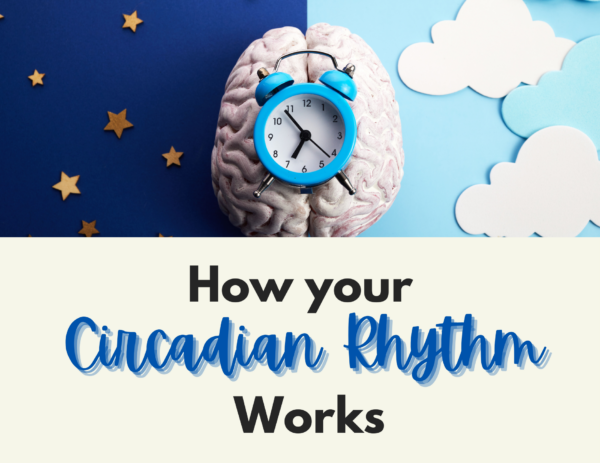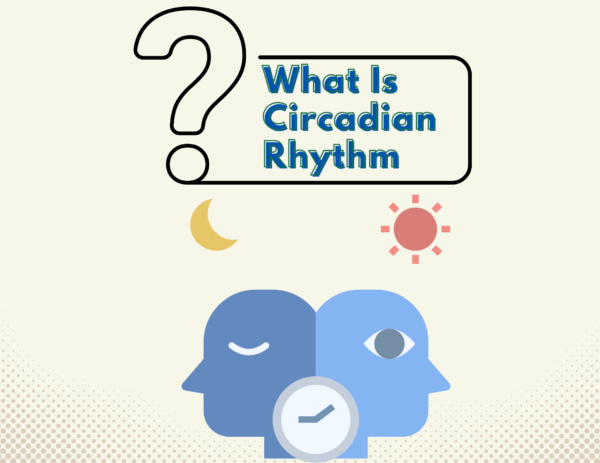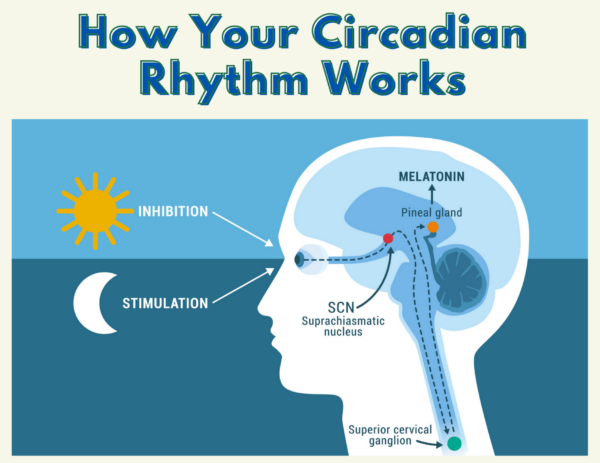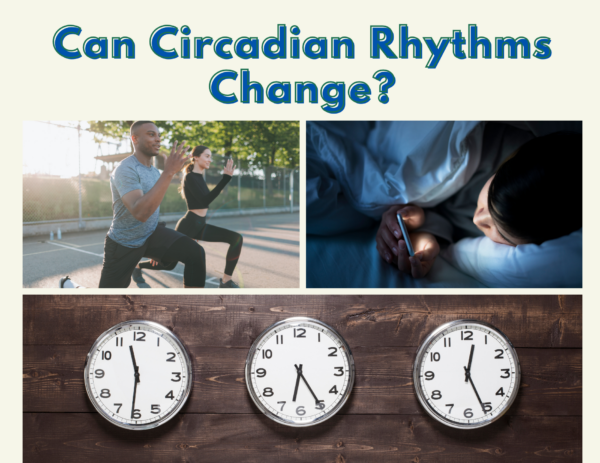
Our bodies and minds love routine. No really, they do. Our bodies naturally try to stick to a 24-hour routine called the circadian rhythm. Maintaining that rhythm is more important than you might think. Circadian rhythm plays a role in how we function – from cardiovascular health to sleep to metabolism regulation.
Stick to your circadian rhythm, or explore healthy ways to adjust it in the event of jet lag or shift work. Your body (and mind) will thank you!
What Is Circadian Rhythm?

Circadian rhythms are 24-hour cycles within humans, animals, and plants. Think of circadian rhythms as a clock. Just as the sun rises and falls at relatively the same time every day, the body strives to carry out the same functions at the same time. This includes the production of hormones, change in internal temperature, and insulin control.
Without circadian rhythms, our bodies would not know when it’s time to sleep or wake up! This distinction is important because our bodies do so much for us as we sleep. Those eight hours of “rest” allow the body to repair muscles, store memories, and prepare us for a new day. We have a lot of reasons to thank (and stick to) circadian rhythms.
How Your Circadian Rhythm Works

Every effect of our circadian rhythm can be traced back to the suprachiasmatic nucleus (SCN). The SCN is located in the hypothalamus, the center for maintaining homeostasis in the body.
Think of the SCN as a navigator. It takes in everything going on in the environment and tells the brain to release hormones or make other changes. The biggest “cue” that gives SCN information about the environment is light. Once it sees its cue, the SCN gives the brain the go-ahead. At different times of day, the brain will release hormones, including:
- Melatonin
- Leptin
- Growth hormone
- Cortisol
Proteins may also be released to regulate digestion. (Ever wonder why you feel so sluggish after lunch? You can thank your circadian rhythm for putting you in “rest and digest” mode!) The release of these hormones and proteins has a variety of effects:
- Reducing and increase energy
- Regulating metabolism, blood sugar, and cholesterol
- Communicating with the immune system
- Repairing DNA
That’s a lot of effects from one clock!
How Circadian Rhythms Affect the Body

The signals that the SCN sends out varies based on the time of day. In the morning, the SCN lets the brain know it’s time to wake up. At night, the brain receives orders to wind down. Basic functions like blood pressure and temperature change when we reach different “times.” These changes allow us to get enough sleep, energy, and rest-and-digestion time to function properly.
Does Circadian Rhythm Affect Blood Pressure?

Blood pressure follows a cycle thanks to circadian rhythms. Our blood pressure lowers slightly as we get ready for sleep and increases in the morning as we wake. There is not a ton of research that reveals how or why this happens. We do know that disruption of circadian rhythms likely puts people at a higher risk of cardiovascular disease.
Does Circadian Rhythm Affect Body Temperature?

Yes! In the morning, the body temperature rises slightly. At night, our internal temperature drops by as much as two degrees! We can assist our bodies through this transition by keeping temperatures cooler at night and warmer in the morning. I use the OOLER sleep system to do this while I’m still in bed! Set up the time you want to wind down and wake up in the morning, and you won’t even have to adjust your thermostat.
Does Circadian Rhythm Affect Sleep?

Most people know about circadian rhythms because of the impact it has on sleep. You may know circadian rhythm as “the sleep-wake cycle.” This is because the production of melatonin and cortisol ease the body in and out of sleep. Melatonin is released at night. Cortisol is released in the morning.
Circadian rhythms are disrupted more often nowadays. Why? Excessive exposure to light “tells” the SCN it is not time for sleep, and melatonin release is halted. This light includes screens. Your smartphone is keeping you from following the natural rhythms of your body.
Can Circadian Rhythms Change?

Yes. Because your SCN takes cues from the light and darkness around it, it may adjust due to:
- Changes in light and darkness (this includes artificial light!)
- Flying to different time zones
- Shift work
Small studies show no sign that diet or meal timing can alter circadian rhythms in significant ways. Exercise may be able to shift circadian rhythms. Early studies show the impact of exercise is still not as significant as exposure to light.
How To Regulate Your Circadian Rhythm

Go to Bed At the Same Time Every Night
Work with your circadian rhythm, not against it! Creating a regular bedtime routine will encourage the release of melatonin at the same time every night. With this release, you will ease right into sleep and begin your eight hours of well-deserved rest.
Get the Right Type of Light at the Right Time
You do not have to take melatonin to help you sleep at night. Instead, reduce blue light exposure earlier to encourage natural production of melatonin. Limit screen time, wear blue light blocking glasses, or opt for red lights to wind down. I love the Hatch Restore Alarm Clock. This allows you to personalize your sleep-wake cycle from your phone. End blue light exposure at the same time every night and wake up in a way that is conducive to cortisol release.
Regulating your circadian rhythm isn’t just about what you do in the evening. Let your alarm clock be a reminder to get outside and expose your eyes to natural light. As early as you can in the day, take a walk outside with no sunglasses! Your body will take the hint that it’s time to wake up.
Get Moving!
Jet lag may be managed best by reducing light at night and exercising in the morning. If you are traveling, don’t forget to pack a travel exercise kit. As always, check with your trusted health professional before starting a new supplement routine.
Take Small Doses of Melatonin
Taking the occasional melatonin supplement can also help you adjust your circadian rhythm while experiencing jet lag. Start with 3mg if you are new to taking melatonin or have been sensitive to it in the past. (5mg and 10mg doses are also available.) Once your circadian rhythm has adjusted, there is no need to continue taking melatonin supplements!
Our bodies have the amazing, natural ability to keep us on a schedule. Do not resist following it, and take advantage of the tools at your disposal if you want to slightly adjust it.
Learned something new about your circadian rhythm? Have you recently adjusted your schedule to work with, or shift, your “internal clock?” Let us know in the comments!
Latest posts by Sylvie McCracken (see all)
- Treating H. Pylori (Part 3): What H. Pylori Does to the Body - August 8, 2022
- Treating H. Pylori (Part 2): How H. Pylori is Contracted - August 3, 2022
- Understanding Beef Labels: Organic, Pastured, Grass-Fed & Grain-Finished - July 25, 2022